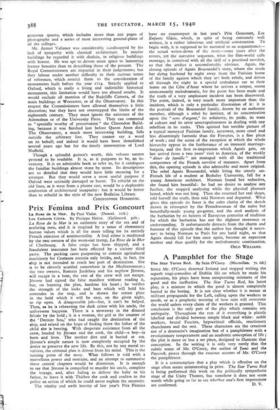Prix Femina and Prix Goncourt
La Rose de la Mer. By Paul Vialar. (Denoel. 2 dr.) Les Enfants Gates. By Philippe Heriat. (Gallimard. 3ofr.) La Rose de la Mer is an authentic story of the sea and of seafaring men, and it is inspired by a sense of elementary human values which is all the more telling for its entirely French rejection of sentimentality. A foul crime is meditated by the two owners of the worn-out tramp, La Rose de la Mer of Cherbourg. A false cargo has been shipped, and a fraudulent insurance has been effected by a sinister third party. The packing cases purporting to contain agricultural machinery for Costanza contain only bricks, and, in fact, the ship is not intended to reach her port of destination. She is to be cleverly scuttled somewhere in the Mediterranean ; the two owners, Romain Jardeheu and his nephew Jerome, will escape in a boat, the rest of the crew will not escape. Jerome had signed the false manifest without reading it, but, on learning the plan, hardens his heart ; he verifies the strength of the locks and bars which will hold his comrades in the trap, and is shown the rotten plate in the hold which it will be easy, on the given night, to rip open. A disagreeable job—but, it can't be helped. Then, as he is rehearsing the dark crime with his uncle, the unforeseen happens. There is a stowaway in the disused fo'csle by the hold ; it is a woman, the girl at the counter of the Dernier Sou,' who had caught the destination of the ship, and seized on the hope of finding there the father of the child she is bearing. With desperate assistance from all the crew, headed by Jerome and the cook, the child—a boy—is born and lives. The mother dies and is buried at sea. Jerome's simple nature is now completely occupied by the desire to preserve the new life. By this, not by any moral re- vulsion, the criminal plan is driven from his mind. This is the turning point of the story. What follows is told with a marvellous power and restraint, and an attempt to summarise these central chapters would be disastrous. It is enough to say that Jerome is compelled to murder his uncle, complete the voyage, and, after failing to deliver the baby to his father, to leave it with Thiebot the cook and confess to the police an action of which he could never explain the necessity.
The vitality and swift brevity of last year's Prix Femina have no counterpart in last year's Prix Goncourt, Les Enfants Gates, which, in spite of being extremely well written, is a rather laborious and artificial construction To begin with, it is supposed to be narrated to an acquaintance— the actual writer-down of the story—some years after the events, yet the narrative sequence, what the film-world calls montage, is contrived with all the skill of a practised novelist, so that the artifice is uncomfortably obvious. Again, the closing episode of Agnes Boussardel's story, where she steals her dying husband by night away from the Parisian home of the family against which they am both rebels, and drives all through the night in a special ambulance car to their home on the G5te d'Azur where he arrives a corpse, seems unnecessarily melodramatic, for the point has been made and the truth of a very unpleasant incident has been discovered. The point, indeed, is very much more important than the incident, which is only a particular illustration of it: it is the portrait of the Boussardel family, drawn by an authentic member, although a rebel by instinct, of its concentration upon the " sens d'argent," its solidarity, its pride, its want of culture and its utter unscrupulousness in dealing with any rebellion in its ranks. This spirited but terrible picture of a typical moneyed Parisian family, narrower, more cruel and less disarmingly fantastic than the Forsytes, is a fine piece of work ; and the scene of the reception at which the whole hierarchy appear in the furtherance of an immoral marriage- bargain, and the first re-impression which Agnes gets, on her arrival from a two years' visit to America, of the weekly " diner de famille" are managed with all the traditional competence of the French novelist of manners. Apart from this, the opening episode is also admirable and more original. The rebel Agnes Boussardel, while living the utterly un- French life of a student at Berkeley University, fell for a young American architect. Norman found her seductive, she found him beautiful: he had no desire to analyse any further, she stopped analysing while the physical pleasure lasted, which was not long. Then she resumed her real shape, told herself the truth, then told Norman and departed. What gives this episode its force is the calm clarity of the sketch drawn in retrospect by the Frenchwoman of the naive but beautifully-made young go-getter, and the cool analysis of the barbarian by an heiress of European centuries of tradition for which the barbarian has not the slightest reverence or understanding. It unfortunately detracts from the charm and humour of this episode that the author has thought it neces- sary to bring Norman to Paris for one lurid night, so that Agnes should fall for him once again, become an expectant mother and thus qualify for the melodramatic continuation.
OaLo WILLIAMS.






















































 Previous page
Previous page